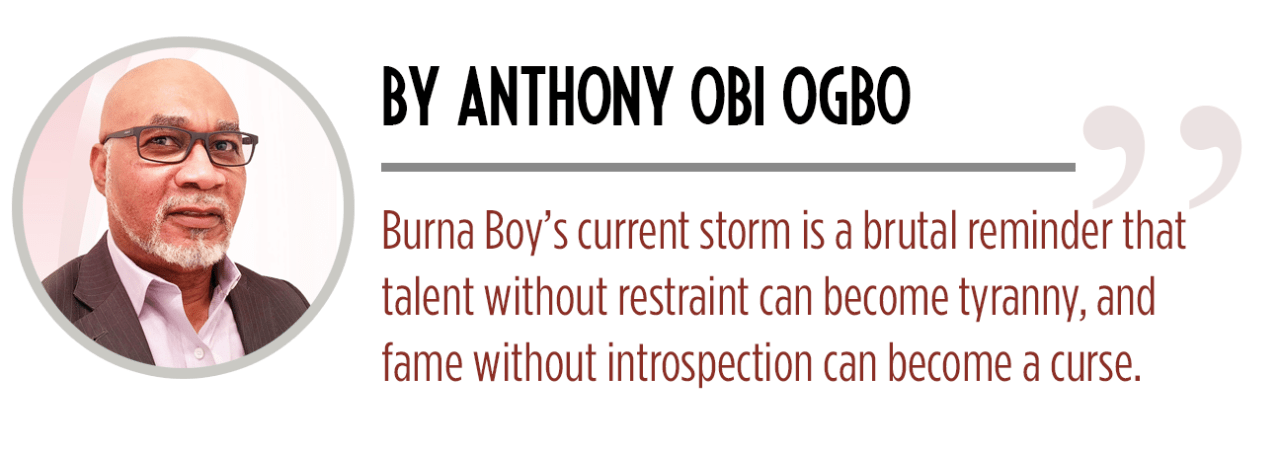“Humility is the anchor that keeps greatness from drifting into delusion.“ —Anthony Obi Ogbo
Fame is a dangerous flame. It warms, it dazzles, and if you hold it too close, it burns straight through the layers of judgment that keep a person grounded. In its hottest glow, fame convinces artists that applause is permanent, talent is immunity, and fans are disposable. Arrogance doesn’t erupt overnight—it grows in the quiet corners of unchecked power, in entourages that never challenge, and in audiences that forgive too easily. But the world has a way of reminding every superstar of one brutal truth: no one is too famous to fall.

This season, Burna Boy is learning that lesson in real time. The Grammy-winning giant—hailed globally as the “African Giant”—is now facing one of the most dramatic reputational meltdowns of his career. Five U.S. arena dates on his NSOW Tour have reportedly been cancelled due to poor ticket sales and a fierce wave of fan backlash following his Denver debacle. What was supposed to be another triumphant American tour has spiraled into an expensive public relations disaster.
It all ignited on November 12, 2025, at the Red Rocks Amphitheatre in Colorado. The show started late. Energy was high. Then Burna Boy spotted a woman in the front row who had fallen asleep. Instead of performing through it, he halted the show, called her out publicly, ordered her partner to “take her home,” and refused to continue until they left. The humiliation would have been bad enough on its own. But later reports revealed she wasn’t drunk or uninterested—she was exhausted, mourning the recent death of her daughter’s father.
The internet demanded empathy. Burna responded with contempt. A sleeping fan, he said, “pisses me the f*** off.” And then the line that detonated the backlash: “I never asked anybody to be my fan.” Those ten words may become the most expensive sentence of his career.
This wasn’t an isolated flare-up. Burna Boy has long danced on the edge of arrogance, and the public has kept receipts. In 2019, he halted a performance in Atlanta to eject a fan who wasn’t dancing—handing the man money and telling him to leave. In Lagos in 2021, a fan who attempted an innocent stage hug was shoved off by security, sparking outrage over excessive force and coldness.
The following year was worse. In 2022, his security team was accused of firing shots in a nightclub after a woman allegedly rejected him, injuring multiple patrons and triggering legal headaches that trailed him for months. Fast-forward to January 2023: at his “Love, Damini” concert in Lagos, he arrived hours late, berated the crowd, and left fans feeling disrespected and insulted.
By 2025, the pattern was undeniable. He kicked a fan offstage during a New Year’s performance. Months later, he brought a Colorado concert to a standstill until an “unengaged” couple was escorted out. The incidents piled up, painting a portrait of an artist increasingly out of touch with the people who made him a global phenomenon.
This latest incident, however, has delivered the sharpest consequence yet: the U.S. market—a notoriously unforgiving arena—has pushed back.
Cancelled shows. Sparse crowds. Boycotts. Refund demands.
For perhaps the first time, an African artist of Burna Boy’s magnitude is experiencing a full-force American-style public accountability storm.
If African entertainers are paying attention, they should treat this moment as a case study in how fame can be mismanaged.
The first lesson: Fan value is sacred. Fans are not props. They are not subjects. They are not inconveniences in an artist’s emotional universe. They are customers, supporters, ambassadors, and—most importantly—the foundation on which every stage, every award, and every paycheck rests.
The second: Empathy is not optional. A superstar who cannot pause long enough to consider that a fan might be grieving, ill, exhausted, or battling something unseen is a superstar who has forgotten the humanity at the core of all art.
The third: Professionalism is currency. Arriving late, publicly shaming fans, halting shows, and weaponizing power in moments of irritation are choices that corrode trust. And once trust is broken, even a global superstar can watch ticket sales collapse in real-time.
Burna Boy is an extraordinary artist—brilliant, groundbreaking, and influential. His musical legacy is secure. But greatness in artistry is not the same as greatness in character. Fame tests the latter far more than it rewards it. And the spotlight, no matter how bright, does not protect anyone from the consequences of their own behavior.Humility is the anchor that keeps greatness from drifting into delusion. Burna Boy’s current storm is a brutal reminder that talent without restraint can become tyranny, and fame without introspection can become a curse. Artists rise because people believe in them, invest in them, and support them. When that respect is abused, loyalty evaporates. The lesson is stark: the higher the pedestal, the harder the fall—and the fall always comes. What matters is not the applause you command, but the humanity you maintain long after the music stops.
♦Publisher of the Guardian News, Professor Anthony Obi Ogbo, Ph.D., is on the Editorial Board of the West African Pilot News. He is the author of the Influence of Leadership (2015) and the Maxims of Political Leadership (2019). Contact: anthony@guardiannews.us
- The Great Divide – How City Boys & Village Boys Mirror Nigeria’s Deepest Political Fractures - February 25, 2026
- China Dazzles the World with Its Spring Festival - February 20, 2026
- Things Are Not the Same Without Osinbajo – Makinde - January 25, 2026
